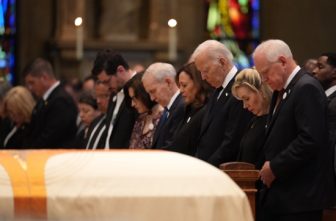
Carol McBrady has no biological children.
But, on the streets of Lusaka, the capital of Zambia, she is known as Mama Carol.
It started 16 years ago when she was invited to visit Africa to help care for children with AIDS. She was supposed to go to Zimbabwe, but violence rocking the country diverted the trip to Zambia.
Ultimately, the trip also changed the course of her life. After two trips to the country, she sold her home in Crystal and moved to Lusaka in 2004. Later, she started a nonprofit called Action for Children Zambia. She now helps hundreds of street children every year by providing crisis intervention, housing and — most importantly — a sense of family.
She also teaches the children how to play blackjack.
It sounds simple, but to these children, who have suffered incredible hardships such as abandonment by their parents at young ages, playing the game gives them, in many cases, their first meaningful contact with an adult.
The bond is mutual, and it’s the reason McBrady embraced these children from almost the moment she got off the plane on her first trip.
“I think the first day or the second day, they took me to the streets, and I worked with the street children and fell in love,” said McBrady, 58, of St. Timothy in Maple Lake. “They are amazing. They are amazing young people. There’s so much potential, there’s so much potential in those streets and so much humanity and so much joy. I had a lot of fun. We played blackjack, and we ate peanut butter sandwiches.”
It wasn’t long before she learned of their tragic circumstances. Hundreds of children roam the streets of Lusaka without a parent or guardian to care for them. For various reasons, they are abandoned. The saddest cases involve one of their parents dying, and the other deciding he or she doesn’t want the children. They are left in the streets to fend for themselves.
Many turn to crime, selling drugs or stealing to put food in their mouths, McBrady said. Most of the children are sexually abused at some point in their lives. The double whammy of abandonment and abuse leads to hardened hearts and deeply rooted anger.
“Those are very difficult kids to fix because they have been so damaged,” McBrady explained. “It’s like, ‘Why are you gonna love me? Everybody else hates me. My mom died, my dad threw me out, who are you, woman?’ They’re difficult [to help].”
As McBrady thought and prayed about how to make a difference, she realized that the one thing these children need but don’t have is family. She decided to do something about that, and she carved out a role as their mother.

Making the move
During the course of making trips in 2001 and 2003, she learned that although nonprofits send a lot of money to help the children, very little of it actually provides for their needs. Corruption and greed funnel the money to those who are supposed to help the children but don’t.
“I did a little research,” McBrady said. “There was so much money going into that country for street kids and orphanages and programs, and none of it was making any difference. They’re not changing anybody’s lives, they’re not helping. There are a few Zambians running these programs who are getting quite rich. But, nobody’s helping the kids.”
McBrady, who spent much of her career doing social work and alternative education for troubled youth in the Twin Cities, decided it was time for someone to go where these children live and become a part of their world.
She said she felt called by God to go to Zambia.
“You know in your head that this is exactly what you’re supposed to do, but in your heart, you’re going, ‘That’s 10,000 miles from home, there’s no electricity, there’s no water, there’s no cappuccino,’” she said. “It was a big change and a long process, but in the end, finally in 2004, I said, ‘That’s it.’ I sold my house, took the money and went [to Zambia].”
She started modestly, living in a small apartment using proceeds from the sale of her home to launch Action for Children Zambia.
In 2007, she built a residential treatment home called Salvation Home, which she uses to help rescue children from the streets and provide a stable living environment. It has 22 beds, but often more children than that live there temporarily. Each time she hears of a child in need, especially with a medical emergency, she brings him or her to Salvation Home for immediate attention.
She later added a poultry farm called Kulanga Bana Farm to provide permanent homes for children and work opportunities. Then, in 2016, she opened Redemption House, a boarding home for children attending secondary school. The ministry has an annual budget of $150,000, and it serves around 250-300 children annually.

Taking to the streets
Though the buildings are important, the foundation of her ministry is going out into the streets to meet the children where they live.
“We do nothing but get to know the children,” she said. “We don’t go into the streets and say, ‘Come home with us.’ We go into the streets and say, ‘Hi, my name is Carol. Nice to meet you. Have you ever played blackjack?’”
One thing she has learned about these children came as a surprise — they not only want a mother’s love, but they also want an education.
Before moving to Zambia, she gave money directly to some children to go to school, which is not free in the country. She wondered if the children would really use it for school.
When she returned to Zambia and followed up, she learned that they had put their school uniforms in their backpacks and used them as a pillow at night, then dutifully attended classes. They did not miss a day, she said.
She remembers one child she rescued at age 14 who had never set foot in a school. By the time he was 19, he had completed all 12 grades and graduated from high school.
The success stories are mounting.
“There really are thousands,” she said. “I think of Jonathan. He came to me when he was about 8. The mother had another baby and said she couldn’t take care of him. We don’t know where the father was. So, Jonathan was supposed to go to the streets and work and bring home the rent money. He didn’t bring home enough one time, so mom kicked him out. … So then, he’s on the street. They said, ‘Let’s go see Mama Carol.’ So they walked probably 20 hours looking for my place. We didn’t have a place then. It was just an apartment building. So, he came. They found me.”
Jonathan’s mother accompanied him, but, all she wanted was rent money.
“I said, ‘I’ll pay your rent this month. Just leave him with me,’” McBrady said. “So, I paid the rent and I took that boy. That was 2005.”
He was in rough shape. He had AIDS and tuberculosis, and it seemed unlikely he would live very long. But, Mama Carol placed him at Salvation Home, and his life turned around.
“There was no reason for this kid to be hopeful, but he was hopeful and wonderful,” McBrady said. “At this point in time, he has finished grade 12 and he’s the house parent at Redemption House for us. He’s alive and healthy.”

McBrady recently got a chance to share her story with Archbishop Bernard Hebda, who now is among her supporters. She was in the Twin Cities in November to raise money and visit her family and parish. She has six living siblings, plus her mother, Mary McBrady, 85. All are involved in the ministry, though none has visited Zambia yet.
“Kids are important, and kids are important to my family,” said Carol McBrady’s sister, Betty Thomes, 61, a parishioner of St. Timothy and chairwoman of Action for Children Zambia’s board who has been involved since the beginning. “So, when we’re changing lives of kids, that’s huge.”
When McBrady first told Thomes of her desire to move to Zambia, Thomes had questions and concerns. But, the background in education that the family shares — Thomes is a former school teacher and principal, and their mother was also a teacher — swayed Thomes to support the radical decision her sister would make.
“She’s an amazing woman,” Thomes said. “And we’re really proud of her, and we would support her in any fashion.
“When she first told us, it was like, ‘Are you kidding? Really? This is what you think God’s calling you to? It turns out he really is calling her there, which is so grand.”
The parish of St. Timothy, likewise, is supportive of her ministry, all the way up to the pastor, Father John Meyer. She comes to the parish on her annual visits to talk about her work and raise money.
“She’s a very dynamic, energetic and hard-working woman doing amazing work there [in Zambia],” Father Meyer said.
Ruth Cioni of Brooklyn Center, McBrady’s friend and a Catholic, has been to Zambia twice and seen Mama Carol in action.
“She’s a tiny, tiny person, but she has a big presence, a very big presence,” said Cioni, 74, who is planning a third trip to Zambia in February. “Boys watch for her car and save a parking space if they see her coming. They come running to spend time with her. She knows many, many of the boys, most of them by name.”
As McBrady gets to know them, she begins the most important part of the process — making them part of a family. When children move in, her staff gets to work scouring the city and even the country to find any remaining relatives. McBrady then contacts them to see if they will take the children in.
Often, the relatives say yes. McBrady said it’s better for the children to be with family rather than to grow up in an institution.
“It’s really important to build families, not just orphanages,” she said. “Our kids don’t have families, but they’re not in orphanages. We make a little family for them, and that becomes their permanent, forever family. It’s more work, but in the end, it’s probably less costly.”
At the end of this month, McBrady will help the street children celebrate Christmas. It’s a highlight of her year. Staff and volunteers spend hours wrapping gifts for each child, totaling several hundred.
The Christmas story is an annual reminder of why she keeps doing what she does, and will continue “until God tells me not to.” It also points to the most important element of her ministry: faith.
“You can do nothing without faith in this world — nothing,” she said. “It wouldn’t even make sense to talk about this without understanding that I am there because of my faith. I am there because I really firmly believe that God did not create street children. That’s a man-made problem, and God wants us to solve it.”





‘We are in this together’: Recent Supreme Court rulings support parents in their vocation